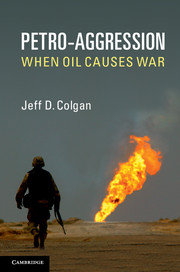Book contents
- Frontmatter
- Contents
- Figures
- Tables
- Acknowledgments
- 1 Introduction
- 2 A theory of oil, revolution, and conflict
- 3 Evidence and research design
- 4 Quantitative impact of oil and revolution on conflict
- 5 Iraq
- 6 Libya and the Arab Jamahiriyya
- 7 Iran
- 8 Venezuela and the Bolivarian Revolution
- 9 Saudi Arabia
- 10 Does oil cause revolution?
- 11 Conclusion and policy implications
- References
- Index
2 - A theory of oil, revolution, and conflict
Published online by Cambridge University Press: 05 February 2013
- Frontmatter
- Contents
- Figures
- Tables
- Acknowledgments
- 1 Introduction
- 2 A theory of oil, revolution, and conflict
- 3 Evidence and research design
- 4 Quantitative impact of oil and revolution on conflict
- 5 Iraq
- 6 Libya and the Arab Jamahiriyya
- 7 Iran
- 8 Venezuela and the Bolivarian Revolution
- 9 Saudi Arabia
- 10 Does oil cause revolution?
- 11 Conclusion and policy implications
- References
- Index
Summary
The oil can is mightier than the sword.
– Everett DicksonAs Chapter 1 notes, petrostates show a remarkable propensity for instigating international conflict. What explains the relationship? This chapter develops the core of my answer to that question, which is then tested empirically in subsequent chapters. My argument draws on existing research on the resource curse, which suggests that oil erodes domestic political accountability due to the ease with which oil revenues can be centralized and controlled by the state’s leadership. I show that the resource curse extends into international politics, and use it conceptually as a building block for the theory of petro-aggression developed in this chapter.
My theory focuses on how state preferences for aggression are formed. Existing research identifies revolutionary states as highly conflict-prone. I extend previous work by arguing that revolutions tend to select risk-tolerant, ambitious leaders who increase their state’s propensity for instigating conflict. I then theorize that oil generates multiple incentives that affect a state’s foreign policy, some of which increase the costs of conflict, and some of which reduce those costs. The net effect of oil depends crucially on the underlying preferences of the state’s leaders. Oil makes revolutionary states even more aggressive than comparable revolutionary states without oil. In non-revolutionary states, however, oil tends not to cause state aggression. In sum, I argue that the effect of oil depends on the state’s domestic politics.
- Type
- Chapter
- Information
- Petro-AggressionWhen Oil Causes War, pp. 16 - 40Publisher: Cambridge University PressPrint publication year: 2013



